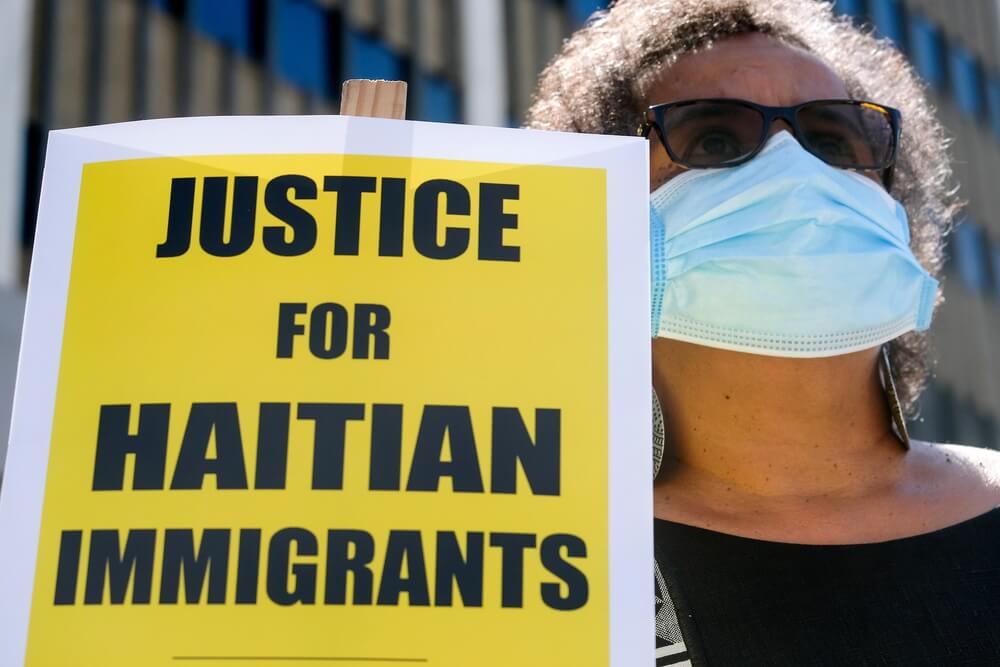Haiti suffers some of the worst humanitarian challenges in the world but this has not stopped Donald Trump from using it as a punching bag as he claws for support ahead of the US presidential elections.
Not only has he repeated insults proven to be false about Haitian immigrants in Ohio eating pet animals but last week he doubled down on threats to revoke the legal status of tens of thousands of Haitians in the US.
All this as gang violence and lawlessness in Haiti are causing the “worst hunger emergency in the western hemisphere”, says the World Food Programme. One in six children in Haiti now face famine-like conditions, with the number at risk having risen more than 20% in six months, says Save the Children.
Haitian and UN officials despair that beyond serving as a touchstone for heated rhetoric over immigration in the US, Haiti is being ignored along with pleas for funding and personnel to beef up a UN-backed security mission to bring calm to the country.
Might the heated immigration debate in the run-up to 5 November’s US presidential elections help or hinder international action to galvanise the resources needed in the troubled Caribbean nation?
A troubled history
“The world has a lot of other priorities,” Garry Conille, the country’s interim leader, told the Financial Times on 6 October. “But the case we’re desperately trying to make is that Haitian children are not less deserving than children in Ukraine or Gaza.”
About 200 gangs have seized control of more than 80% of the capital Port-au-Prince and are expanding their presence around the country since President Jovenel Moïse was assassinated in 2021 and interim leader Ariel Henry was forced to step down earlier this year. He was replaced with a transitional presidential council led by Conille with elections scheduled for next year.
At least 70 people were killed on 3 October by the Haitian Gran Grif gang who fired on people with automatic rifles, many of which are trafficked from the US, in the worst massacre since at least 2018.
Haiti has a troubled history with international assistance
Haiti has a troubled history with international assistance after previous UN missions were marred by sex abuse scandals and the spread of cholera. Nonetheless, the country requested help to quell violence and a year ago the UN approved the Multinational Security Support (MSS) mission to support Haitian police forces.
The mission was expected to total about 2,500 officers from nations including Bangladesh, Barbados and Chad but so far only 400 officers mostly from Kenya are deployed.
After last week’s “horrifying” attack, the UN’s Human Rights Office urged “increased international financial and logistical assistance” to the Kenyan-led mission.
A few days earlier, the UN Security Council had voted unanimously to extend the mission for another year until 2 October, 2025 but Chinese and Russian opposition meant the rejection of a plan from the US and Ecuador to make it an official UN peacekeeping force, which would have had the heft of the international body’s funding and support.
Humanitarian funding
The mission is dependent on countries making voluntary donations of cash and personnel and it has made little progress to quash the gangs. Meanwhile, up to 80% of Haiti’s 7,000-strong police forces are in administrative or other functions rather than frontline duties, Conille told the Financial Times.
He left on 5 October for a trip to Kenya and the United Arab Emirates to seek further support for the national police force. So far, Kenya has promised another 600 officers while Jamaica, Belize and Guatemala have pledged to send more.
The US has declined to send people but is the main source of financial support, giving $300 million in equipment including armoured vehicles. A total of $600 million a year is needed but the UN has only received pledges of $85 million.
Humanitarian funding is also badly needed. Some 5.4 million people are struggling to feed themselves in Haiti and of them, two million are facing emergency levels of hunger in the backyard of the US.
The number of internally displaced people has doubled to more than 700,000 in the last six months.
“We must not turn our backs on the worst hunger emergency in the Western hemisphere,” said Cindy McCain, executive director of the World Food Programme. UN agencies need $230 million to fund programmes until the end of this year.
A Marshall Plan
“Armed groups are using hunger and hopelessness of children to recruit them into their ranks,” said Chantal Sylvie Imbeault, Save the Children’s country director in Haiti. “The violence has created a chokehold on humanitarian aid, leaving us unable to reach the most vulnerable.”
 The US has a “moral obligation” to help Haitians rebuild their nation - Art Estopinan
The US has a “moral obligation” to help Haitians rebuild their nation - Art Estopinan
Human Rights Watch says it saw “glimmers of hope” for Haiti following a recent visit, including a pledge by Conille, who has a humanitarian background, to prioritise the rule of law in contrast to other Haitian leaders who have used the criminal gangs to access resources and win elections.
Meanwhile, the US has a “moral obligation” to help Haitians rebuild their nation, wrote Art Estopinan, former chief of staff to the chairman of the US House Foreign Affairs Committee, in The Hill web site.
He called for a Marshall Plan akin to that which helped rebuild Europe after the Second World War and which would help Haiti unlock its economic potential, including an estimated $20 billion in precious minerals.
“A stable and thriving Haiti is not just about national security — it’s about doing what’s right,” he wrote.